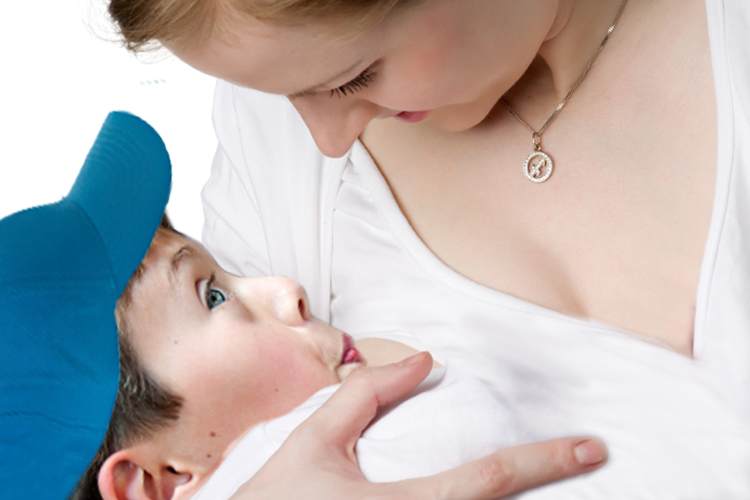The image of a tiny baby nuzzling at her mother’s breast is as iconic as the Madonna and child themselves. The image of a kindergartener doing likewise, however, is a lightning rod for heated discussion. Two years ago,a documentary on the “Extraordinary Breastfeeding” mother of an 8-year-old became a minor sensation in the UK. This weekend, the old “it’s perfectly natural/ew that’s gross” debate kicked up again when the Daily Mail ran a story on author Ann Sinnott, who’s just written the provocatively entitled book “Breastfeeding Older Children.”
Sinnott, who nursed her daughter past the age of 6, obviously has her own dog in the hunt here. “What thoughts come to mind at the notion of children aged eight and older breastfeeding?” she asks. “You will think of sex and possibly think the mother is sexually deviant. You will also think of emotional disturbance in both the mother and child. What is the basis for such thoughts? Is there any evidence? The answer to that, of course, is no. The basis for such judgments is cultural.”
“Of course”? Really? Wow, I wish every controversial issue in life were that easily dismissed!
The World Health Organization recommends breast-feeding exclusively for the first six months of a child’s life, and continuing to age 2 or beyond. And advocates of long-term breast-feeding say that the comfort and security their children get from it is worth the effort long after the nutritional benefits have diminished. They also claim it’s really about taking cues from the kids, letting them decide when they’re ready to wean.
But does that mean there’s never a point at which comfort becomes creepy? Is squeamishness with the notion of a schoolchild who still breast-feeds automatically a sign of our own ingrained uptightness, or a genuine red flag that maybe it’s not the child who’s needy here?
I give the Daily Mail — a newspaper that routinely puts down the personal choices of its female readership — props for stepping up with a balanced, inquisitive story. Writer Barbara Davies doesn’t judge, and she doesn’t flinch. Instead, she reasonably says, “Surely the very least we should do is ask more questions — however unpalatable the whole idea may be to many of us.”
The story’s commenters, however, were less circumspect. “You breast fed your child for your own emotional reasons. You OVER BONDED with your child,” tut-tutted one writer, while another chimed in that “Okay, so our behaviour should be dictated by what animals do. Wish I’d known that when I was stressed just after giving birth. I should have just eaten my baby — because this is what animals do.” But others, including a woman who wrote, “My mother breastfed me until I was five. I really don’t understand why everyone must judge,” strongly disagreed. And Sinnott herself jumped into the fray, saying, “Critics, examine your thoughts and feelings: where do they come from, what fears do they express? In truth, they are nothing more than cultural prejudice.”
Yet maybe cultural prejudice is getting a bad rap here. I’m all for subverting paradigms, but I’m a little skeptical when educated, well-heeled parents who enjoy all the benefits of living in the industrialized world seem eager to selectively glom on to the social mores of people living in an entirely different set of circumstances. If the oft-trotted out, largely unprovable statistic that the global average age for weaning is 4, it still doesn’t give a DS-playing 4-year-old in London a whole lot in common with a 4-year-old in a rural community where the drinking water may be unsafe. And despite the fact that breasts are built for nourishment, their erotic use is right up there too — a distinction that plenty of school-age children are already capable of sussing out. What happens when they’ve had years and years of associating them with one thing only — mom? And what happens to mom when she’s spent so many years in such a symbiotic relationship with her offspring?
There are no hard and fast rules for motherhood – they change dramatically even from child to child within the same family. And there’s no one-size-fits-all age at which to wean. But the murky reality of what’s really appropriate for children – and their own increasing awareness of the cues their mothers give them – makes it all less clear-cut. And if it takes a village to raise a child, you’ve just got to be prepared for the whole village to have an opinion on how to do it.


